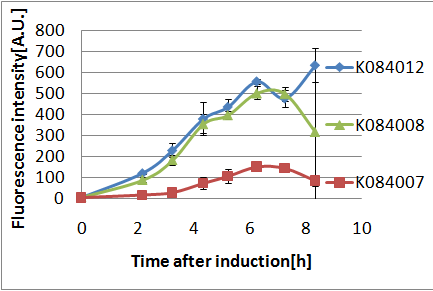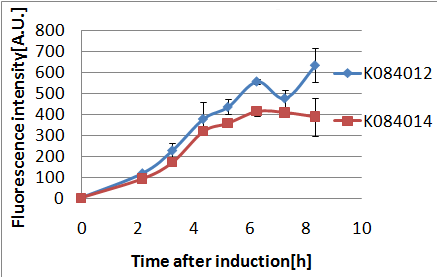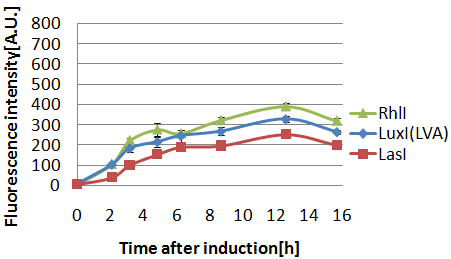Team:Chiba/Sender experiments/Senders(XL10Gold) T9002(JW1908)
From 2008.igem.org
(Difference between revisions)
(→Reaction temparature:37°C) |
(→Sender culture:500μL,Receiver:500μL) |
||
| (57 intermediate revisions not shown) | |||
| Line 13: | Line 13: | ||
__NOTOC__ | __NOTOC__ | ||
| + | ==Results== | ||
| + | ===Reaction temparature:37°C=== | ||
| + | ====Sender culture:500μL,Receiver:500μL==== | ||
| + | [[Image:Chiba_communication_XL10Gol_37_RS1_01.gif|thumb|left|'''Fig.1''' <br>E.coli strain,Senders:XL10Gold,BBa_T9002:JW1908,37°C.All measurements are averages from three replicate cultures with error bars representing standard deviations.]] | ||
| + | [[Image:Chiba_talks_XL10G_37_RS1_02.gif|thumb|left|'''Fig.2''' <br>E.coli strain,Senders:XL10Gold,BBa_T9002:JW1908,37°C.All measurements are averages from three replicate cultures with error bars representing standard deviations.]] | ||
| + | [[Image:Chiba_talks_XL10G_37_RS1_03.gif|thumb|left|'''Fig.3''' <br>E.coli strain,Senders:XL10Gold,BBa_T9002:JW1908,37°C.All measurements are averages from three replicate cultures with error bars representing standard deviations.]] | ||
| + | <br clear="all"> | ||
| + | *Fig. 1 | ||
| + | *results | ||
| + | **Cultures containing cells transformed with LuxI gene([http://partsregistry.org/Part:BBa_K084012 BBa_K084012])and cells transformed with RhlI gene([http://partsregistry.org/Part:BBa_K084008 BBa_K084008]) express gfp and fluorescence intensity was reached to 500.Cultures containing cells transformed with LasI gene([http://partsregistry.org/Part:BBa_K084007 BBa_K084007]) weakly expressed gfp,and fluorescence intensity was not reached to a significant level. | ||
| + | *Discussion | ||
| + | #Maximum fluorescence intensity was vary,however,time before gfp expression doesn't differ. | ||
| + | #We concluded that LasI gene([http://partsregistry.org/Part:BBa_K084007 BBa_K084007]) was not work well at this condition. | ||
| - | + | *Fig. 2 | |
| - | + | *Results | |
| - | * | + | Fluorescence intensity of the culture containing cells transformed with LuxI gene([http://partsregistry.org/Part:BBa_K084012 BBa_K084012]) was lower than that of the cultures containing the cells transformed with LVA LuxI-LVA gene([http://partsregistry.org/Part:BBa_K084014 BBa_K084014]).The difference of maximum fluorescence intesity between the two cultures was 200. |
| - | [[ | + | *Discussion |
| + | **The rate of AHL synthesis decreased by the degradation of autoinducer synthase,however,the length of time before gfp expression is same. | ||
| - | |||
| - | + | *Fig. 3 | |
| - | + | *Results | |
| + | Cultures containing cells transformed with RhlI gene([http://partsregistry.org/Part:BBa_K084008 BBa_K084008]) and RhlI+LVA([http://partsregistry.org/Part:BBa_K084009 BBa_K084009]) draw the same transfer curve. | ||
| + | *Discussion | ||
| + | **We concluded that there was no effect of LVA-tag on time before gfp expression. | ||
| - | |||
| - | |||
| - | |||
| - | |||
| - | |||
| - | + | <br clear=all> | |
| - | + | [[Image:Chiba_talks_XL10Gold_37_RS1_0917_01.gif|thumb|left|'''Fig.4''' <br>E.coli strain,Senders:XL10Gold,BBa_T9002:JW1908,37°C.All measurements are averages from three replicate cultures with error bars representing standard deviations.]] | |
| - | + | [[Image:Chiba_talks_XL10Gold_37_RS1_0917_02.gif|thumb|left|'''Fig.5''' <br>E.coli strain,Senders:XL10Gold,BBa_T9002:JW1908,37°C.All measurements are averages from three replicate cultures with error bars representing standard deviations.]] | |
| - | + | ||
| - | + | ||
| - | + | ||
| - | |||
| - | |||
| - | |||
| - | |||
| - | |||
| - | |||
<br clear=all> | <br clear=all> | ||
| - | |||
| - | |||
| - | |||
| + | ====Sender culture:100μL,Receiver:1000μL==== | ||
| + | [[Image:Chiba_talks_XL10Gold_37_RS1_01.gif|thumb|left|'''Fig. 6''' | ||
| + | <br>E.coli strain,Senders:XL10Gold,BBa_T9002:JW1908,37°C.All measurements are averages from three replicate cultures with error bars representing standard deviations.]] | ||
<br clear=all> | <br clear=all> | ||
| + | |||
| + | ====Sender culture:10μL,Receiver:1000μL==== | ||
===Reaction temparature:30°C=== | ===Reaction temparature:30°C=== | ||
| - | * | + | *Sender culture:500μL, Receiver culture:500μL |
| - | [[Image:Chiba_talks_XL10G_30-1_RS1_01.gif|thumb|left|'''Fig. | + | [[Image:Chiba_talks_XL10G_30-1_RS1_01.gif|thumb|left|'''Fig.7''' <br>E.coli strain,BBa_K084007:XL10Gold,BBa_T9002:JW1908,30°C.All measurements are averages from three replicate cultures with error bars representing standard deviations.]] |
| - | [[Image:Chiba_talks_XL10G_30-1_RS1_02.gif|thumb|left|'''Fig. | + | [[Image:Chiba_talks_XL10G_30-1_RS1_02.gif|thumb|left|'''Fig.8''' <br>E.coli strain,BBa_K084007:XL10Gold,BBa_T9002:JW1908,30°C.All measurements are averages from three replicate cultures with error bars representing standard deviations.]] |
<br clear="all"> | <br clear="all"> | ||
| - | * | + | *Fig. 7 |
| - | * | + | *Result |
| - | + | #The highest maximum fluorescence intensity was caused by RhlI gene,followed by LuxI(with LVA) and LasI gene. | |
| - | + | #Fluorescence intensity of the two culture containing cells transformed with LuxI gene and RhlI gene amount to 200 for 2 hour as fast as LasI gene. | |
| - | * | + | *Discussion |
| - | + | #Maximum fluorescence intensity caused by RhlI gene was higher than that caused by LuxI gene.There are two reasons: | |
| - | + | #RhlI was more active at this experimental condition. | |
| + | #LuxI was well degraded by protease. | ||
| + | #We concluded that LVA-tag effective in this condition. | ||
| - | * | + | *Fig. 8 |
| - | * | + | *Result |
| - | ** | + | **Comparing RhlI with Rhl+LVAtag, fluoroscence intensity were almost same. |
| - | * | + | *Discussion |
| - | ** | + | **In this condition, production efficiency of LuxI protein higher than of LVAtag. |
| - | + | ||
| - | ===Reaction temparature: | + | ===Reaction temparature:25°C=== |
| - | ==== | + | ====Sender culture:500μL,Receiver culture:500μL==== |
| - | [[Image:Chiba_talks_XL10Gold_25_RS1_01.gif|thumb|left|'''Fig. | + | [[Image:Chiba_talks_XL10Gold_25_RS1_01.gif|thumb|left|'''Fig.9''' <br>E.coli strain,Senders:XL10Gold,BBa_T9002:JW1908,25°C.All measurements are averages from three replicate cultures with error bars representing standard deviations.]] |
| - | [[Image:Chiba_talks_XL10Gold_25_RS1_02.gif|thumb|left|'''Fig. | + | [[Image:Chiba_talks_XL10Gold_25_RS1_02.gif|thumb|left|'''Fig.10''' <br> E.coli strain,Senders:XL10Gold,BBa_T9002:JW1908,25&ded;C.All measurements are averages from three replicate cultures with error bars representing standard deviations.]] |
<br clear=all> | <br clear=all> | ||
| - | * | + | *Fig.9 |
| - | * | + | *results |
| - | + | #The value of fluoroscence intensity by LuxI, RhlI, LasI gene at 25°c were almost the same as negative control at 30 and 37°c. | |
| - | + | #The last value of fluoroscence intensity by LasI gene was a half of LuxI and RhlI. | |
| - | * | + | *Discussion |
| - | + | #Low temperature of 25°c caused decrease of production efficiency of AHL synthase. | |
| - | + | #Static culture keep sender and receiver from shaking, in the end , expression of GFP decreased. | |
| - | * | + | *Fig.10 |
| - | * | + | *Result |
| - | ** | + | **The fluoroscence intensity by RhlI with LVAtag is less than RhlI without LVAtag. |
| - | * | + | *Discussion |
| - | ** | + | **LVAtag is effective in this condition. |
<br clear=all> | <br clear=all> | ||
[[Team:Chiba/Project/Experiments:Sender_Crosstalk||Back to Sender experiment and result]] | [[Team:Chiba/Project/Experiments:Sender_Crosstalk||Back to Sender experiment and result]] | ||
Latest revision as of 09:47, 30 October 2008
| Home | The Team | The Project | Parts Submitted to the Registry | Reference | Notebook | Acknowledgements |
|---|
Results
Reaction temparature:37°C
Sender culture:500μL,Receiver:500μL
- Fig. 1
- results
- Cultures containing cells transformed with LuxI gene([http://partsregistry.org/Part:BBa_K084012 BBa_K084012])and cells transformed with RhlI gene([http://partsregistry.org/Part:BBa_K084008 BBa_K084008]) express gfp and fluorescence intensity was reached to 500.Cultures containing cells transformed with LasI gene([http://partsregistry.org/Part:BBa_K084007 BBa_K084007]) weakly expressed gfp,and fluorescence intensity was not reached to a significant level.
- Discussion
- Maximum fluorescence intensity was vary,however,time before gfp expression doesn't differ.
- We concluded that LasI gene([http://partsregistry.org/Part:BBa_K084007 BBa_K084007]) was not work well at this condition.
- Fig. 2
- Results
Fluorescence intensity of the culture containing cells transformed with LuxI gene([http://partsregistry.org/Part:BBa_K084012 BBa_K084012]) was lower than that of the cultures containing the cells transformed with LVA LuxI-LVA gene([http://partsregistry.org/Part:BBa_K084014 BBa_K084014]).The difference of maximum fluorescence intesity between the two cultures was 200.
- Discussion
- The rate of AHL synthesis decreased by the degradation of autoinducer synthase,however,the length of time before gfp expression is same.
- Fig. 3
- Results
Cultures containing cells transformed with RhlI gene([http://partsregistry.org/Part:BBa_K084008 BBa_K084008]) and RhlI+LVA([http://partsregistry.org/Part:BBa_K084009 BBa_K084009]) draw the same transfer curve.
- Discussion
- We concluded that there was no effect of LVA-tag on time before gfp expression.
Sender culture:100μL,Receiver:1000μL
Sender culture:10μL,Receiver:1000μL
Reaction temparature:30°C
- Sender culture:500μL, Receiver culture:500μL
- Fig. 7
- Result
- The highest maximum fluorescence intensity was caused by RhlI gene,followed by LuxI(with LVA) and LasI gene.
- Fluorescence intensity of the two culture containing cells transformed with LuxI gene and RhlI gene amount to 200 for 2 hour as fast as LasI gene.
- Discussion
- Maximum fluorescence intensity caused by RhlI gene was higher than that caused by LuxI gene.There are two reasons:
- RhlI was more active at this experimental condition.
- LuxI was well degraded by protease.
- We concluded that LVA-tag effective in this condition.
- Fig. 8
- Result
- Comparing RhlI with Rhl+LVAtag, fluoroscence intensity were almost same.
- Discussion
- In this condition, production efficiency of LuxI protein higher than of LVAtag.
Reaction temparature:25°C
Sender culture:500μL,Receiver culture:500μL
- Fig.9
- results
- The value of fluoroscence intensity by LuxI, RhlI, LasI gene at 25°c were almost the same as negative control at 30 and 37°c.
- The last value of fluoroscence intensity by LasI gene was a half of LuxI and RhlI.
- Discussion
- Low temperature of 25°c caused decrease of production efficiency of AHL synthase.
- Static culture keep sender and receiver from shaking, in the end , expression of GFP decreased.
- Fig.10
- Result
- The fluoroscence intensity by RhlI with LVAtag is less than RhlI without LVAtag.
- Discussion
- LVAtag is effective in this condition.
|Back to Sender experiment and result
 "
"










